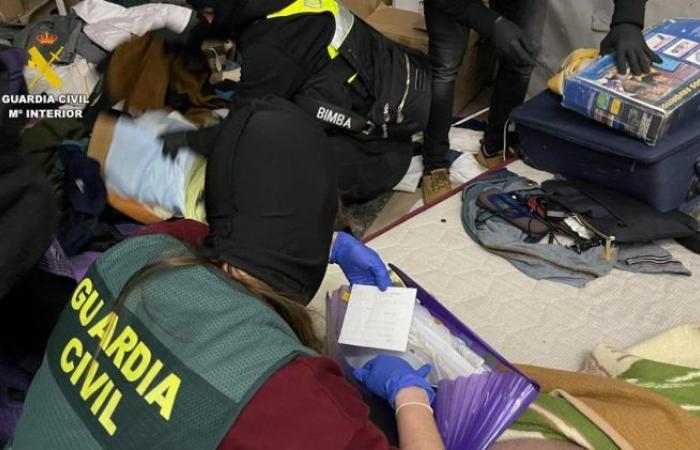An international criminal card fraud network operating between Spain and Morocco has been dismantled, following a joint operation by the Spanish Civil Guard and the Bilbao municipal police. Named “ Dania “, this operation led to the arrest of four individuals and the opening of investigations against seven other alleged members of the network. Investigations uncovered fraud exceeding 90,000 euros, mainly focused on the misappropriation of banking data and the illegal trade in high-tech electronic products.
It all started in November 2023, when a mobile phone distributor located in Valencia alerted the authorities after noticing suspicious orders on its online site, totaling 9,490 euros. A complaint was filed, and the ensuing investigation revealed a complex, organized fraud scheme. The criminal network used credit card data stolen from residents of European countries such as Denmark, Germany and Norway. The process used, known as carding, involves stealing credit card information and testing its validity on low-value purchases before proceeding with larger transactions.
The fraudsters specifically targeted high-end mobile phones, devices which, due to their high demand and ability to retain their value, are popular on the parallel market. The products purchased fraudulently were mainly expensive electronic devices, which they then transported to Morocco for resale.
One of the most striking revelations of this investigation was the connection with Morocco. Indeed, during the examination of the fraudulently obtained mobile phones, investigators noted that some were used with Moroccan SIM cards, which made it possible to trace some of the products to their final destination. The discovery of these connections allowed law enforcement to confirm that the phones were never activated in Spain, but transported clandestinely to Morocco where they were sold on the black market.
Read also: Casablanca: A man arrested after climbing a police vehicle
Operation “Dania” was carried out rigorously, notably through several searches in the Spanish cities of Bilbao and Durango, where the suspects had set up several recovery points for items purchased illegally. Four raids resulted in the seizure of a total of 48 mobile phones suspected of having been purchased using stolen credit cards, as well as various electronic devices, identity documents and more than 5,800 euros in cash. Among the items seized were also two Moroccan passports, further proof of the network's links with the Maghreb country.
The role of Spanish establishments in the network
The investigation also shed light on the inner workings of the criminal network. The fraudsters operated from several establishments located in Bilbao and Durango, using at least 13 different telephone lines to organize their transactions. It appeared that certain members of the network resided in these premises to monitor illegal goods and guarantee their distribution to foreign destinations, notably Morocco. The scale of the network appears larger than initially estimated, with transactions spread over several months.
One of the most disturbing aspects of this case is the revelation of the exploitation of undocumented workers. During the operation, law enforcement discovered two people in an irregular situation, which led to the involvement of the Spanish Labor and Social Security Inspectorate in the investigation. This highlights another dimension of the criminal organization, that of the exploitation of labor in precarious working conditions.
To date, Spanish authorities have confirmed that the amount of fraud linked to the 33 cards analyzed amounted to 56,200 euros. However, they estimate that the total amount of fraudulent transactions could have exceeded 91,500 euros, with some transactions having been canceled or returned due to missing or incorrect data on the cards used. The case, still under investigation, is under the supervision of the Instruction Court number 8 of Bilbao. The investigation could extend to other members of the network, and prosecutions for money laundering and criminal conspiracy are being considered.
An international network with extensive ramifications
This case reveals the scale of transnational criminal networks that exploit flaws in the international banking system and electronic commerce. The use of carding and transactions via stolen cards, combined with a system of reselling electronic products in illegal markets, demonstrates the ingenuity of criminals to circumvent control systems. This case also highlights the risks linked to the security of banking data and the need for reinforced international cooperation to combat these forms of cross-border fraud.
The Spanish authorities, as part of this operation, have once again demonstrated their ability to dismantle complex criminal networks and protect consumers. However, the investigations suggest a major challenge in the fight against this type of crime, with implications that extend well beyond Spain's borders.
Operation “Dania” demonstrates the effectiveness of collaboration between Spanish law enforcement, local and international authorities to stem a phenomenon of large-scale bank card fraud. If this case illustrates the adaptability of criminals, it also reminds us of the importance of constant vigilance in the protection of sensitive information and electronic commerce. The Spanish authorities, after this significant seizure, hope to be able to dismantle other similar networks, helping to stem the phenomenon on a global scale.






